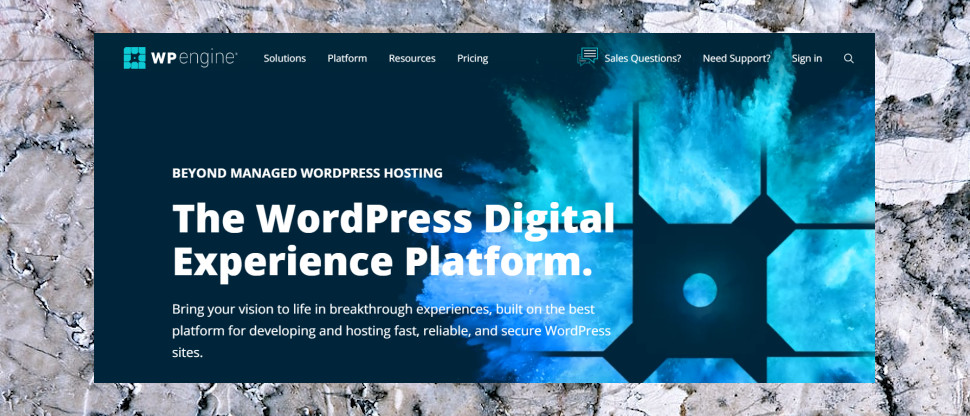TechRadar Verdict
A fully-featured managed WordPress hosting service at a reasonable price, WP Engine is a solid choice for SMEs to host a WordPress website.
Pros
- +
Excellent 24/7 customer support
- +
Includes all major features you could want
Cons
- -
Cheaper managed WordPress hosting exists
- -
Extensive features could intimidate newcomers
Why you can trust TechRadar
One in twelve people online visit a website hosted on WP Engine daily. They host over one and a half million sites across 150 countries and still maintain a customer satisfaction rate of 96%. That is reliable hosting.
WP Engine uses its own caching system and content delivery system (CDN) and your get your choice of data centers in North America, Europe, or Asia. Plus, your websites are hosted on the fast Google Cloud Platform. This all means your customers should have a better user experience because of faster loading times and reliability.
WP Engine’s managed WordPress hosting solution
WP Engine provides everything needed for a true managed WordPress solution, including automatic PHP and WordPress updates, effortless backups, all without compromising on security and speed. Currently offering 4 months free for TechRadar readers. Get 4 months free on all new annual plans with code: techradar20.
WP Engine manages your WordPress site for you making the day-to-day running of your site easier allowing you to focus on your business. In addition, WP Engine provides features like automatic plugin updates, malware detection, and automated backups. Although managed hosting comes at a higher cost than unmanaged, it's not until a vulnerability is discovered at 2am on a Saturday that the value of having someone look over the security and updates of your server becomes really noticeable.
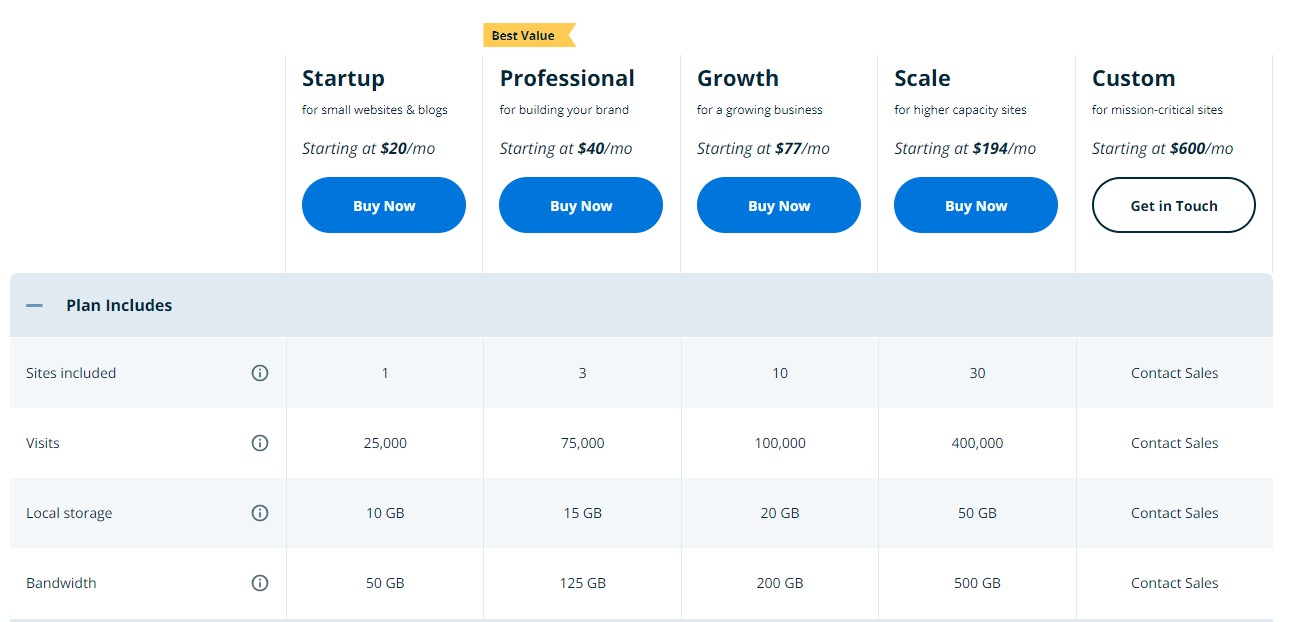
WP Engine Plans and pricing
WP Engine have three main types of hosting: WordPress Hosting, WooCommerce Hosting, and Headless.
WordPress hosting has five plans which are all on a shared infrastructure. The most basic plan is Startup which provides hosting for one site, 25,000 monthly visits (with a 50GB bandwidth cap which is enough for the average website), and 10GB local storage.
With this plan you get chat only support, security patching, plugin risk scans, daily backups, EverCache, and global CDN. This plan is $20/mo and refreshingly there are no confusing renewal prices.
From there onwards, the plans support 3, 10, and 30 sites and the bandwidth, storage space, and monthly visits increase as you would expect. There is also the option to completely customize your plan starting from $600/mo.
For WooCommerce, the plans are similar in their specs and what they support but they come with lots of features as standard such as elastic search capabilities, support for unlimited products, Live Cart, and more. These plans are slightly more expensive than the WordPress hosting plans and the custom plan costs a minimum of $800/mo.
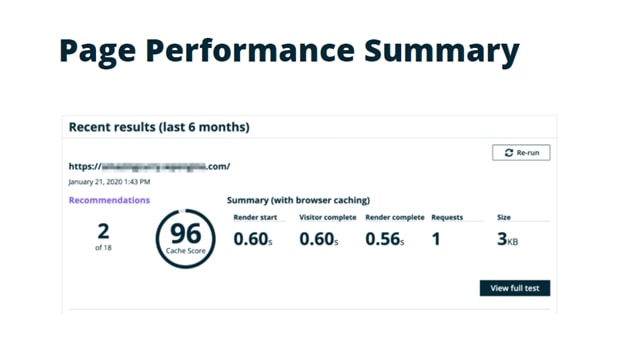
Features
The core reasons to choose WP Engine over cheaper WordPress hosting are increased reliability, performance, support, and management, but these are hard to quantify. Some features stand out when you browse the interface, however, that can give you some insight into the service offered.
WP Engine Page Performance is a neat tool designed to help you speed up your WordPress site by offering meaningful metrics on performance.
Running a test returns you a page-performance report that details how quickly your page rendered, how long it took to load in its entirety, and the total size of the page. It even includes historical data on your site’s performance over the past six months and recommendations on how you can reduce page load.
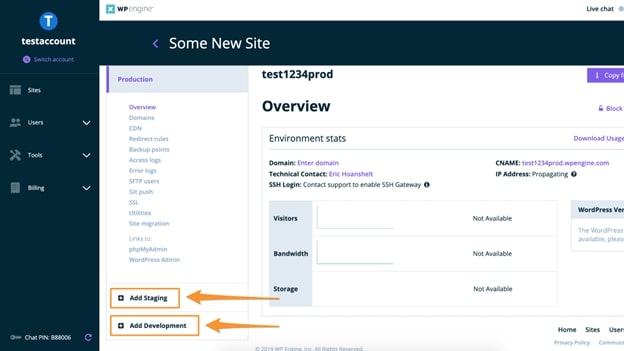
Avoid embarrassing mistakes on your site by making changes to a copy of your website before it goes live. This is called Staging, and it allows your developers to make extensive changes to your site without affecting your customers.
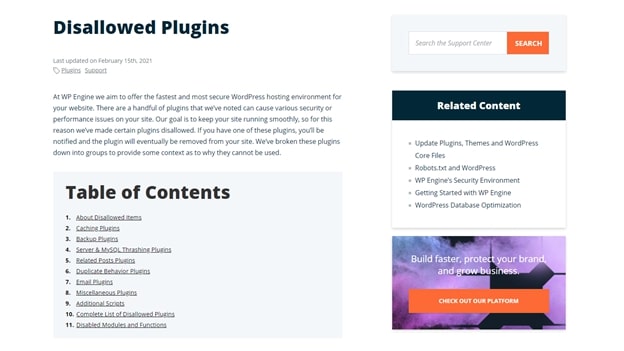
In a relatively unusual move, WP Engine restricts the WordPress plugins you can install. Those typically restricted are plugins that have been noted to cause performance issues and security holes. For important features such as caching, backups, and search engine optimization tools, WP Engine has made alternatives available that don’t put a high load on the server.
Interface and in use
WP Engine’s interface is professional and well laid out, but the powerful features might mean a steep learning curve for inexperienced users. If you have an understanding of terms like Git, CNAME, and redirect rules, you’ll be right at home here, but otherwise you’ll need to spend some time on the support site.
In our testing, the default WordPress home page loaded in just over two seconds. This is one of the fastest responses we’ve tested, with competitor Liquid Web only slightly behind.
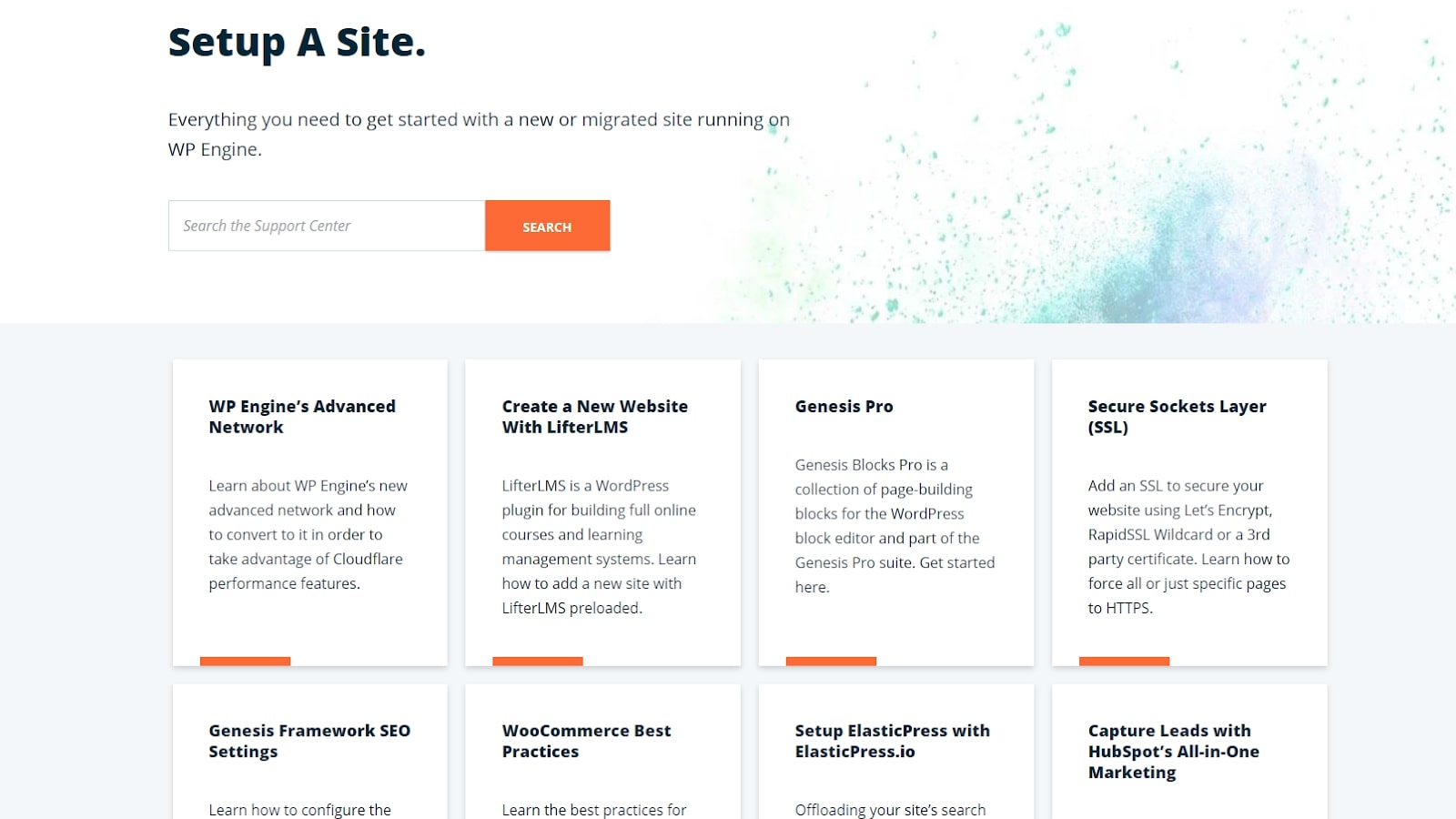
Support
A managed WordPress service should offer extra value through its support, and WP Engine delivers. The support site includes videos and articles of a quality you’d expect from a paid training course, with help on deeper WordPress functionality that many WordPress hosts don’t go into.
There’s 24/7 live chat support and a ticket system, too. In our testing, the response was quick and the agent knowledgeable. For all plans except for single-site plans, there’s telephone support, too.
The competition
If it’s the higher level of customer support you value in a managed WordPress host, Liquid Web often tops customer satisfaction polls. It has a focus on high-end products like virtual private servers (VPS) and dedicated servers, so if your needs extend beyond a high-performance WordPress site into other software solutions, we recommend checking it out.
TsoHost is another managed web hosting provider we recommend. The price can ramp up, with even the most basic VPS options starting at $52 per month, but you get a level of on-hands customer support that’s virtually unrivaled.
Final verdict
Though not the cheapest managed WordPress hosting company around, we feel WP Engine’s speed, reliability, and long list of features warrant its higher price.
It’s not the first WordPress host we’d recommend to newcomers, as the breadth of tools can be intimidating.
But features like the integrated content delivery network, staging, caching, automated backups and great customer support makes it easy to recommend to SMEs that need a WordPress host that will grow with their needs.
One in twelve people online visit a website hosted on WP Engine daily. They host over one and a half million sites across 150 countries and still maintain a customer satisfaction rate of 96%. That is reliable hosting.
WP Engine uses its own caching system and content delivery system (CDN) and your get your choice of data centers in North America, Europe, or Asia. Plus, your websites are hosted on the fast Google Cloud Platform. This all means your customers should have a better user experience because of faster loading times and reliability.
WP Engine’s managed WordPress hosting solution
WP Engine provides everything needed for a true managed WordPress solution, including automatic PHP and WordPress updates, effortless backups, all without compromising on security and speed. Currently offering 4 months free for TechRadar readers. Get 4 months free on all new annual plans with code: techradar20.
WP Engine manages your WordPress site for you making the day-to-day running of your site easier allowing you to focus on your business. In addition, WP Engine provides features like automatic plugin updates, malware detection, and automated backups. Although managed hosting comes at a higher cost than unmanaged, it's not until a vulnerability is discovered at 2am on a Saturday that the value of having someone look over the security and updates of your server becomes really noticeable.

Plans and pricing
WP Engine have three main types of hosting: WordPress Hosting, WooCommerce Hosting, and Headless.
WordPress hosting has five plans which are all on a shared infrastructure. The most basic plan is Startup which provides hosting for one site, 25,000 monthly visits (with a 50GB bandwidth cap which is enough for the average website), and 10GB local storage.
With this plan you get chat only support, security patching, plugin risk scans, daily backups, EverCache, and global CDN. This plan is $20/mo and refreshingly there are no confusing renewal prices.
From there onwards, the plans support 3, 10, and 30 sites and the bandwidth, storage space, and monthly visits increase as you would expect. There is also the option to completely customize your plan starting from $600/mo.
For WooCommerce, the plans are similar in their specs and what they support but they come with lots of features as standard such as elastic search capabilities, support for unlimited products, Live Cart, and more. These plans are slightly more expensive than the WordPress hosting plans and the custom plan costs a minimum of $800/mo.

Features
The core reasons to choose WP Engine over cheaper WordPress hosting are increased reliability, performance, support, and management, but these are hard to quantify. Some features stand out when you browse the interface, however, that can give you some insight into the service offered.
WP Engine Page Performance is a neat tool designed to help you speed up your WordPress site by offering meaningful metrics on performance.
Running a test returns you a page-performance report that details how quickly your page rendered, how long it took to load in its entirety, and the total size of the page. It even includes historical data on your site’s performance over the past six months and recommendations on how you can reduce page load.

Avoid embarrassing mistakes on your site by making changes to a copy of your website before it goes live. This is called Staging, and it allows your developers to make extensive changes to your site without affecting your customers.

In a relatively unusual move, WP Engine restricts the WordPress plugins you can install. Those typically restricted are plugins that have been noted to cause performance issues and security holes. For important features such as caching, backups, and search engine optimization tools, WP Engine has made alternatives available that don’t put a high load on the server.
Interface and in use
WP Engine’s interface is professional and well laid out, but the powerful features might mean a steep learning curve for inexperienced users. If you have an understanding of terms like Git, CNAME, and redirect rules, you’ll be right at home here, but otherwise you’ll need to spend some time on the support site.
In our testing, the default WordPress home page loaded in just over two seconds. This is one of the fastest responses we’ve tested, with competitor Liquid Web only slightly behind.

Support
A managed WordPress service should offer extra value through its support, and WP Engine delivers. The support site includes videos and articles of a quality you’d expect from a paid training course, with help on deeper WordPress functionality that many WordPress hosts don’t go into.
There’s 24/7 live chat support and a ticket system, too. In our testing, the response was quick and the agent knowledgeable. For all plans except for single-site plans, there’s telephone support, too.
The competition
If it’s the higher level of customer support you value in a managed WordPress host, Liquid Web often tops customer satisfaction polls. It has a focus on high-end products like virtual private servers (VPS) and dedicated servers, so if your needs extend beyond a high-performance WordPress site into other software solutions, we recommend checking it out.
TsoHost is another managed web hosting provider we recommend. The price can ramp up, with even the most basic VPS options starting at $52 per month, but you get a level of on-hands customer support that’s virtually unrivaled.
Final verdict
Though not the cheapest managed WordPress hosting company around, we feel WP Engine’s speed, reliability, and long list of features warrant its higher price.
It’s not the first WordPress host we’d recommend to newcomers, as the breadth of tools can be intimidating.
But features like the integrated content delivery network, staging, caching, automated backups and great customer support makes it easy to recommend to SMEs that need a WordPress host that will grow with their needs.
One in twelve people online visit a website hosted on WP Engine daily. They host over one and a half million sites across 150 countries and still maintain a customer satisfaction rate of 96%. That is reliable hosting.
WP Engine uses its own caching system and content delivery system (CDN) and your get your choice of data centers in North America, Europe, or Asia. Plus, your websites are hosted on the fast Google Cloud Platform. This all means your customers should have a better user experience because of faster loading times and reliability.
WP Engine’s managed WordPress hosting solution
WP Engine provides everything needed for a true managed WordPress solution, including automatic PHP and WordPress updates, effortless backups, all without compromising on security and speed. Currently offering 4 months free for TechRadar readers. Get 4 months free on all new annual plans with code: techradar20.
WP Engine manages your WordPress site for you making the day-to-day running of your site easier allowing you to focus on your business. In addition, WP Engine provides features like automatic plugin updates, malware detection, and automated backups. Although managed hosting comes at a higher cost than unmanaged, it's not until a vulnerability is discovered at 2am on a Saturday that the value of having someone look over the security and updates of your server becomes really noticeable.

Plans and pricing
WP Engine have three main types of hosting: WordPress Hosting, WooCommerce Hosting, and Headless.
WordPress hosting has five plans which are all on a shared infrastructure. The most basic plan is Startup which provides hosting for one site, 25,000 monthly visits (with a 50GB bandwidth cap which is enough for the average website), and 10GB local storage.
With this plan you get chat only support, security patching, plugin risk scans, daily backups, EverCache, and global CDN. This plan is $20/mo and refreshingly there are no confusing renewal prices.
From there onwards, the plans support 3, 10, and 30 sites and the bandwidth, storage space, and monthly visits increase as you would expect. There is also the option to completely customize your plan starting from $600/mo.
For WooCommerce, the plans are similar in their specs and what they support but they come with lots of features as standard such as elastic search capabilities, support for unlimited products, Live Cart, and more. These plans are slightly more expensive than the WordPress hosting plans and the custom plan costs a minimum of $800/mo.

Features
The core reasons to choose WP Engine over cheaper WordPress hosting are increased reliability, performance, support, and management, but these are hard to quantify. Some features stand out when you browse the interface, however, that can give you some insight into the service offered.
WP Engine Page Performance is a neat tool designed to help you speed up your WordPress site by offering meaningful metrics on performance.
Running a test returns you a page-performance report that details how quickly your page rendered, how long it took to load in its entirety, and the total size of the page. It even includes historical data on your site’s performance over the past six months and recommendations on how you can reduce page load.

Avoid embarrassing mistakes on your site by making changes to a copy of your website before it goes live. This is called Staging, and it allows your developers to make extensive changes to your site without affecting your customers.

In a relatively unusual move, WP Engine restricts the WordPress plugins you can install. Those typically restricted are plugins that have been noted to cause performance issues and security holes. For important features such as caching, backups, and search engine optimization tools, WP Engine has made alternatives available that don’t put a high load on the server.
Interface and in use
WP Engine’s interface is professional and well laid out, but the powerful features might mean a steep learning curve for inexperienced users. If you have an understanding of terms like Git, CNAME, and redirect rules, you’ll be right at home here, but otherwise you’ll need to spend some time on the support site.
In our testing, the default WordPress home page loaded in just over two seconds. This is one of the fastest responses we’ve tested, with competitor Liquid Web only slightly behind.

Support
A managed WordPress service should offer extra value through its support, and WP Engine delivers. The support site includes videos and articles of a quality you’d expect from a paid training course, with help on deeper WordPress functionality that many WordPress hosts don’t go into.
There’s 24/7 live chat support and a ticket system, too. In our testing, the response was quick and the agent knowledgeable. For all plans except for single-site plans, there’s telephone support, too.
The competition
If it’s the higher level of customer support you value in a managed WordPress host, Liquid Web often tops customer satisfaction polls. It has a focus on high-end products like virtual private servers (VPS) and dedicated servers, so if your needs extend beyond a high-performance WordPress site into other software solutions, we recommend checking it out.
TsoHost is another managed web hosting provider we recommend. The price can ramp up, with even the most basic VPS options starting at $52 per month, but you get a level of on-hands customer support that’s virtually unrivaled.
Final verdict
Though not the cheapest managed WordPress hosting company around, we feel WP Engine’s speed, reliability, and long list of features warrant its higher price.
It’s not the first WordPress host we’d recommend to newcomers, as the breadth of tools can be intimidating.
But features like the integrated content delivery network, staging, caching, automated backups and great customer support makes it easy to recommend to SMEs that need a WordPress host that will grow with their needs.
One in twelve people online visit a website hosted on WP Engine daily. They host over one and a half million sites across 150 countries and still maintain a customer satisfaction rate of 96%. That is reliable hosting.
WP Engine uses its own caching system and content delivery system (CDN) and your get your choice of data centers in North America, Europe, or Asia. Plus, your websites are hosted on the fast Google Cloud Platform. This all means your customers should have a better user experience because of faster loading times and reliability.
WP Engine’s managed WordPress hosting solution
WP Engine provides everything needed for a true managed WordPress solution, including automatic PHP and WordPress updates, effortless backups, all without compromising on security and speed. Currently offering 4 months free for TechRadar readers. Get 4 months free on all new annual plans with code: techradar20.
WP Engine manages your WordPress site for you making the day-to-day running of your site easier allowing you to focus on your business. In addition, WP Engine provides features like automatic plugin updates, malware detection, and automated backups. Although managed hosting comes at a higher cost than unmanaged, it's not until a vulnerability is discovered at 2am on a Saturday that the value of having someone look over the security and updates of your server becomes really noticeable.

Plans and pricing
WP Engine have three main types of hosting: WordPress Hosting, WooCommerce Hosting, and Headless.
WordPress hosting has five plans which are all on a shared infrastructure. The most basic plan is Startup which provides hosting for one site, 25,000 monthly visits (with a 50GB bandwidth cap which is enough for the average website), and 10GB local storage.
With this plan you get chat only support, security patching, plugin risk scans, daily backups, EverCache, and global CDN. This plan is $20/mo and refreshingly there are no confusing renewal prices.
From there onwards, the plans support 3, 10, and 30 sites and the bandwidth, storage space, and monthly visits increase as you would expect. There is also the option to completely customize your plan starting from $600/mo.
For WooCommerce, the plans are similar in their specs and what they support but they come with lots of features as standard such as elastic search capabilities, support for unlimited products, Live Cart, and more. These plans are slightly more expensive than the WordPress hosting plans and the custom plan costs a minimum of $800/mo.

Features
The core reasons to choose WP Engine over cheaper WordPress hosting are increased reliability, performance, support, and management, but these are hard to quantify. Some features stand out when you browse the interface, however, that can give you some insight into the service offered.
WP Engine Page Performance is a neat tool designed to help you speed up your WordPress site by offering meaningful metrics on performance.
Running a test returns you a page-performance report that details how quickly your page rendered, how long it took to load in its entirety, and the total size of the page. It even includes historical data on your site’s performance over the past six months and recommendations on how you can reduce page load.

Avoid embarrassing mistakes on your site by making changes to a copy of your website before it goes live. This is called Staging, and it allows your developers to make extensive changes to your site without affecting your customers.

In a relatively unusual move, WP Engine restricts the WordPress plugins you can install. Those typically restricted are plugins that have been noted to cause performance issues and security holes. For important features such as caching, backups, and search engine optimization tools, WP Engine has made alternatives available that don’t put a high load on the server.
Interface and in use
WP Engine’s interface is professional and well laid out, but the powerful features might mean a steep learning curve for inexperienced users. If you have an understanding of terms like Git, CNAME, and redirect rules, you’ll be right at home here, but otherwise you’ll need to spend some time on the support site.
In our testing, the default WordPress home page loaded in just over two seconds. This is one of the fastest responses we’ve tested, with competitor Liquid Web only slightly behind.

Support
A managed WordPress service should offer extra value through its support, and WP Engine delivers. The support site includes videos and articles of a quality you’d expect from a paid training course, with help on deeper WordPress functionality that many WordPress hosts don’t go into.
There’s 24/7 live chat support and a ticket system, too. In our testing, the response was quick and the agent knowledgeable. For all plans except for single-site plans, there’s telephone support, too.
The competition
If it’s the higher level of customer support you value in a managed WordPress host, Liquid Web often tops customer satisfaction polls. It has a focus on high-end products like virtual private servers (VPS) and dedicated servers, so if your needs extend beyond a high-performance WordPress site into other software solutions, we recommend checking it out.
TsoHost is another managed web hosting provider we recommend. The price can ramp up, with even the most basic VPS options starting at $52 per month, but you get a level of on-hands customer support that’s virtually unrivaled.
Final verdict
Though not the cheapest managed WordPress hosting company around, we feel WP Engine’s speed, reliability, and long list of features warrant its higher price.
It’s not the first WordPress host we’d recommend to newcomers, as the breadth of tools can be intimidating.
But features like the integrated content delivery network, staging, caching, automated backups and great customer support makes it easy to recommend to SMEs that need a WordPress host that will grow with their needs.
One in twelve people online visit a website hosted on WP Engine daily. They host over one and a half million sites across 150 countries and still maintain a customer satisfaction rate of 96%. That is reliable hosting.
WP Engine uses its own caching system and content delivery system (CDN) and your get your choice of data centers in North America, Europe, or Asia. Plus, your websites are hosted on the fast Google Cloud Platform. This all means your customers should have a better user experience because of faster loading times and reliability.
WP Engine’s managed WordPress hosting solution
WP Engine provides everything needed for a true managed WordPress solution, including automatic PHP and WordPress updates, effortless backups, all without compromising on security and speed. Currently offering 4 months free for TechRadar readers. Get 4 months free on all new annual plans with code: techradar20.
WP Engine manages your WordPress site for you making the day-to-day running of your site easier allowing you to focus on your business. In addition, WP Engine provides features like automatic plugin updates, malware detection, and automated backups. Although managed hosting comes at a higher cost than unmanaged, it's not until a vulnerability is discovered at 2am on a Saturday that the value of having someone look over the security and updates of your server becomes really noticeable.

Plans and pricing
WP Engine have three main types of hosting: WordPress Hosting, WooCommerce Hosting, and Headless.
WordPress hosting has five plans which are all on a shared infrastructure. The most basic plan is Startup which provides hosting for one site, 25,000 monthly visits (with a 50GB bandwidth cap which is enough for the average website), and 10GB local storage.
With this plan you get chat only support, security patching, plugin risk scans, daily backups, EverCache, and global CDN. This plan is $20/mo and refreshingly there are no confusing renewal prices.
From there onwards, the plans support 3, 10, and 30 sites and the bandwidth, storage space, and monthly visits increase as you would expect. There is also the option to completely customize your plan starting from $600/mo.
For WooCommerce, the plans are similar in their specs and what they support but they come with lots of features as standard such as elastic search capabilities, support for unlimited products, Live Cart, and more. These plans are slightly more expensive than the WordPress hosting plans and the custom plan costs a minimum of $800/mo.

Features
The core reasons to choose WP Engine over cheaper WordPress hosting are increased reliability, performance, support, and management, but these are hard to quantify. Some features stand out when you browse the interface, however, that can give you some insight into the service offered.
WP Engine Page Performance is a neat tool designed to help you speed up your WordPress site by offering meaningful metrics on performance.
Running a test returns you a page-performance report that details how quickly your page rendered, how long it took to load in its entirety, and the total size of the page. It even includes historical data on your site’s performance over the past six months and recommendations on how you can reduce page load.

Avoid embarrassing mistakes on your site by making changes to a copy of your website before it goes live. This is called Staging, and it allows your developers to make extensive changes to your site without affecting your customers.

In a relatively unusual move, WP Engine restricts the WordPress plugins you can install. Those typically restricted are plugins that have been noted to cause performance issues and security holes. For important features such as caching, backups, and search engine optimization tools, WP Engine has made alternatives available that don’t put a high load on the server.
Interface and in use
WP Engine’s interface is professional and well laid out, but the powerful features might mean a steep learning curve for inexperienced users. If you have an understanding of terms like Git, CNAME, and redirect rules, you’ll be right at home here, but otherwise you’ll need to spend some time on the support site.
In our testing, the default WordPress home page loaded in just over two seconds. This is one of the fastest responses we’ve tested, with competitor Liquid Web only slightly behind.

Support
A managed WordPress service should offer extra value through its support, and WP Engine delivers. The support site includes videos and articles of a quality you’d expect from a paid training course, with help on deeper WordPress functionality that many WordPress hosts don’t go into.
There’s 24/7 live chat support and a ticket system, too. In our testing, the response was quick and the agent knowledgeable. For all plans except for single-site plans, there’s telephone support, too.
The competition
If it’s the higher level of customer support you value in a managed WordPress host, Liquid Web often tops customer satisfaction polls. It has a focus on high-end products like virtual private servers (VPS) and dedicated servers, so if your needs extend beyond a high-performance WordPress site into other software solutions, we recommend checking it out.
TsoHost is another managed web hosting provider we recommend. The price can ramp up, with even the most basic VPS options starting at $52 per month, but you get a level of on-hands customer support that’s virtually unrivaled.
Final verdict
Though not the cheapest managed WordPress hosting company around, we feel WP Engine’s speed, reliability, and long list of features warrant its higher price.
It’s not the first WordPress host we’d recommend to newcomers, as the breadth of tools can be intimidating.
But features like the integrated content delivery network, staging, caching, automated backups and great customer support makes it easy to recommend to SMEs that need a WordPress host that will grow with their needs.

Mike is a lead security reviewer at Future, where he stress-tests VPNs, antivirus and more to find out which services are sure to keep you safe, and which are best avoided. Mike began his career as a lead software developer in the engineering world, where his creations were used by big-name companies from Rolls Royce to British Nuclear Fuels and British Aerospace. The early PC viruses caught Mike's attention, and he developed an interest in analyzing malware, and learning the low-level technical details of how Windows and network security work under the hood.
